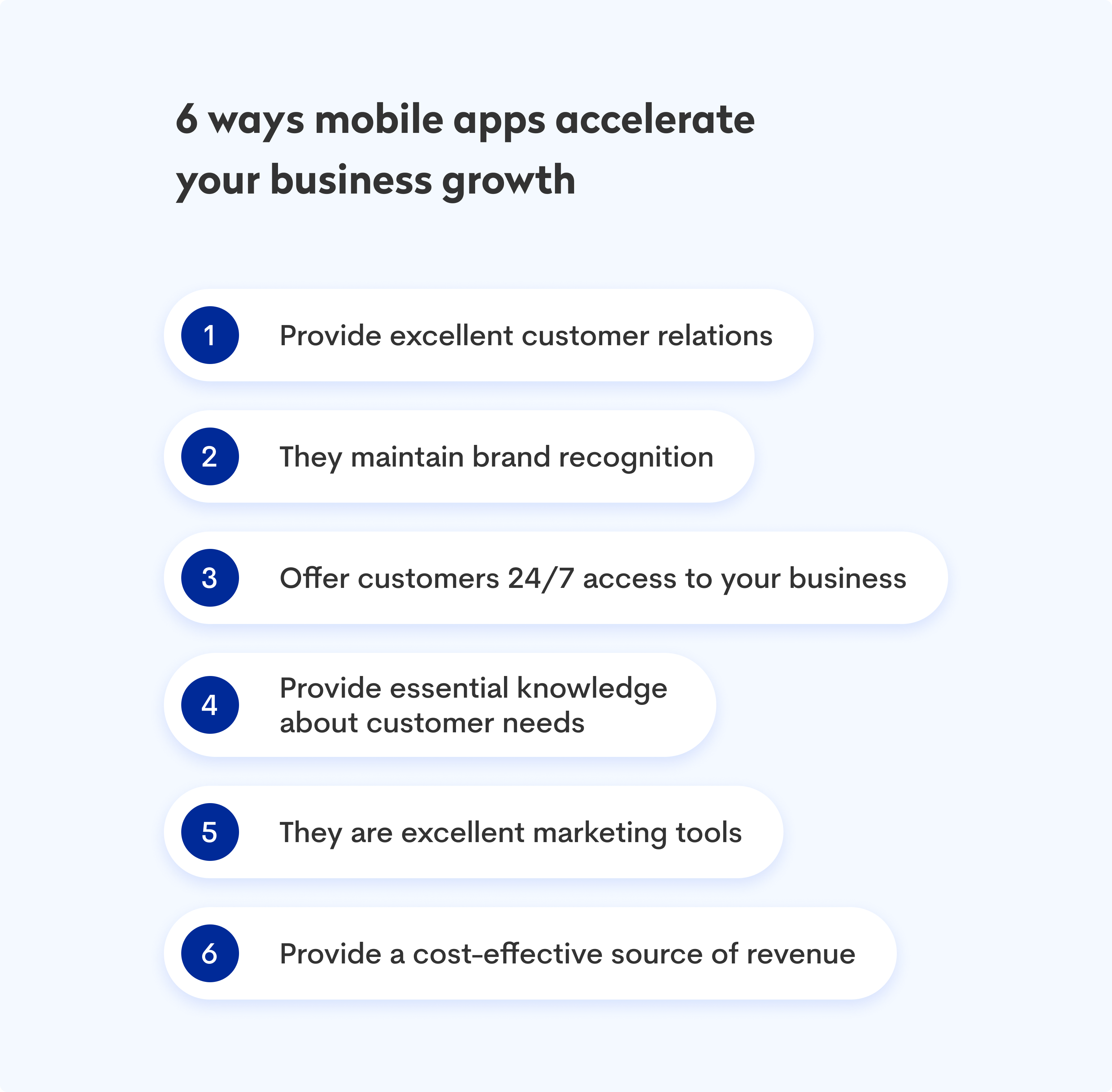The question presented in the title of this article may seem strange. What is the point of asking about the importance of mobile apps when, today, almost everyone has a smartphone in their pocket and uses dozens of apps daily?
There are over 7.1 billion smartphone users worldwide. Everyone uses countless apps on their phones or tablets, from location-based apps to weight loss apps that constantly send us notifications according to a set configuration. The extensive development of mobile apps means that apps cover almost everything: shopping, travel, keeping fit, games, entertainment, and much more.
Mobile application market boom
According to Zippia.com, the average smartphone owner uses 9–10 apps per day and 30 per month. Projections set by Statista.com predict that by 2026, consumers will have downloaded 143 billion mobile apps from the Google Play Store, up around 30 percent from the 111 billion apps downloaded in 2021. Consequently, this means that absence from the online space means lost profits. In 2021, users downloaded more than 435,000 apps per minute (according to the State of Mobile 2022 report). The numbers speak for themselves; the mobile app market is not something to be underestimated.
Based on these statistics, the world is consumed with the development of mobile applications. Hence, if organizations want to reach their customers, they must recognize their popularity. Companies are increasingly moving away from physical marketing, such as handing out flyers, printing ads, and hanging billboards. If you care about business benefits, it is worth considering the development of a mobile application. So let’s get to the specifics.
What is a mobile application?
According to Techopedia, mobile apps are software designed to run on mobile devices such as smartphones and tablets. They are generally small, individual software units with limited functionality. While they may have little functionality, they provide users with a high-quality service or experience. Apps range from simple games to highly sophisticated solutions depending on the needs and expectations of the target audience.
Initially, mobile apps were intended to offer productivity support, contact retrieval, email scheduling, and calendar management. However, strong customer interest has encouraged app publishers to develop apps for various categories, including games, entertainment, social networking, and news.
Is it commercially viable to invest in a mobile app?
This is the first question that comes to mind. Will investing in a mobile app bring any return? Yes! We have the numbers to prove it. According to the State of Mobile 2022 report, consumers spent $170 billion in app stores in 2021. That’s 19% more than the previous year. Since people are unlikely to stop using cell phones anytime soon, this is a good investment.
Let’s now go through some arguments that will demonstrate the impact of mobile apps on a company’s financial success.
6 advantages of mobile app development
Developing a custom mobile app not only helps your company stay relevant and be at the forefront of new technologies. It also helps improve customer relations and build brand loyalty. Here are six reasons to consider building a mobile app if you want to develop or update your current product.
1. Mobile apps strengthen customer relationships
According to Forbes, 76% of consumers prefer to save time by shopping on their phones, and most smartphone users use mobile apps over websites. Customers no longer want to wait for a website to load. They want quick and easy access to your business at the touch of a button.
A custom mobile app is an effective way to instantly provide customers with the information and services they need and an opportunity to keep them interested. To do this, you can target ads to customers who use their smartphones to search for products and services similar to yours. Additionally, you can use your app to stay in touch with existing customers and have them download updates regularly.
2. Company branding, or how apps enhance your brand
Mobile apps are for more than just well-known brands like Netflix or Zalando. Small and medium-sized brands are building mobile apps, understanding that a customized mobile app can build credibility, familiarity, and customer trust.
An example of this is Telegram, a messaging app. It is one of the more popular messaging apps, having over 500 million active users (2022 data). What makes Telegram better than all other messaging apps? Although the app offers nothing extraordinary, it allows seamless synchronization with all devices and is fast and secure. This has raised Telegram’s brand value.
3. The ability to access your business 24/7
Unlike a traditional store, mobile apps offer customers 24/7 access to your products and services. With targeted messages and information, access to apps is much more convenient than websites. Some apps are even available offline. With 24/7 access, customers obtain answers to their questions at any time of the day without having to talk to a service representative to find the information they need. The convenience of a mobile app is extremely valuable to customers. It allows them to take advantage of the availability of your resources frequently.
4. Mobile apps provide needed customer information
Mobile applications can be tailored precisely to the customer’s preferences. These specific choices and interests can then be used when studying future growth. What app features have customers used the most, and what is most in demand? The data and feedback collected from the app can form the basis of an entire marketing campaign if assembled correctly. This connects to the next point 😉
5. Mobile apps are great marketing tools
You can use apps to reach a wider audience with your marketing campaigns. Within the app, you can manage messages, contact information, team information, or engagement tools such as contests and campaigns. The more customers recognize your marketing materials, participate in your campaigns, or engage with your app, the more likely they will remember your brand for the long term.
6. Mobile apps are profitable
Companies can monetize their apps through targeted ads for in-app purchases. With a well-built mobile app, you can make it easy for your customers to buy products or services with just a few taps on their smartphones. You can also use your app to offer special deals and discounts to encourage customers to buy more. With mobile apps, you can offer loyalty programs and discounts to encourage customers to return.
 Types of mobile applications and their use in business
Types of mobile applications and their use in business
If you are planning to build an app for your company, the most critical question to answer is, how to choose the type of mobile app? When analyzing the decision factors, you should answer the question, what is the priority for your company now? This answer will determine the best type of app for your current needs and capabilities.
1. Native applications
Decisive factor: My application must be fast and stable
Native apps are designed specifically for operating systems such as iOS or Android. For this reason, native apps may use device-specific hardware and software (such as a camera). They also can take advantage of the unique features of a specific operating system, such as push notifications on iOS devices.
Pros: Due to their unique nature, native apps have the advantage of being faster and more reliable in terms of performance. Typically, they are more efficient in using device resources than other mobile apps. Native apps use the device’s native user interface, giving users a more optimized customer experience.
Cons: However, the problem with native apps is that if you start developing them, you must replicate efforts for each platform. Code created for one platform cannot be reused on another. Since they are designed for a single platform, they cannot be mixed and matched. By definition, native applications are not cross-platform, and their development process is unique to each platform. For example, they are written in a coding language specific to the mobile platform. So iOS apps are written in Objective-C or Swift, while Android apps use Java or Kotlin. This poses a development barrier due to the complexity of mobile software development and the need for specialized developers.
2. Progressive Web Applications (PWA)
Decisive factor: I need the application as soon as possible!
If you need an app in the shortest possible time, it’s worth investing in building a PWA web app. Web apps behave similarly to native apps, but are accessed through a web browser on a mobile device.
They are not standalone apps because they have to download and install code on the device. They are responsive websites that adapt the interface to the user’s device. PWA apps are often designed using HTML5, CSS, JavaScript, Ruby, and similar programming languages used for the web.
Pros: Because it’s web-based, there’s no need to customize it to the platform or operating system, reducing development costs. In addition, from the end user’s point of view, PWAs are lightweight and easy to use on mobile devices (no app store). From a developer’s point of view, the changes are much faster than native apps and are easier to maintain.
Cons: Web apps depend entirely on the device’s browser. Functions become available in one browser and unavailable in another, which provides users with different experiences. Moreover, they will only work partially offline. Regardless of an offline mode, the device will still require an Internet connection to back up data, offer new data, or refresh screen content.
3. Hybrid applications
Decision-making factor: I have limited time and financial resources
A hybrid application is a combination of native and PWA applications. They are developed as native applications, but use web technologies such as HTML5 and CSS3. In building them, developers use web technologies and native APIs. Frequently used technologies include: React Native, Ionic, Objective-C, Swift, HTML5, and others.
A hybrid application is an ideal solution in the early stages of product development. Within a few months, you can create an MVP, allowing you to test user reaction and popularity in the market. If the product proves successful, you can later build a fully native version.
Pros: It is much faster and more economical to create a hybrid app than a native app. They are easier to develop than native apps because you don’t have to write them from scratch for each platform. Both factors make accessing the developers required to create a hybrid app much easier and cheaper. A key advantage of hybrid apps is that no further verification is needed once approved for inclusion in the app store.
Cons: Unfortunately, hybrid applications can lack the power and speed that are the hallmarks of native applications. This is because the solutions in question do not directly use native modules. Some users may also be discouraged by needing to enter the app store to download the application.
How will a mobile app affect your business?
We have discussed the most important mobile app types, each with its advantages. Choosing the right type of app for your business will depend on your budget, target audience, and business goals.
Being aware of mobile apps will help you reach a wider audience and increase sales. If you want to build a popular app, there are several things to consider. First, you must create a high-quality app that meets your customers’ needs. To do this, you should work with experienced mobile application engineers. Second, you must develop a marketing plan to promote your product and effectively reach your target audience. Similarly, you must constantly update and improve your app to ensure its popularity among users.
If you want to talk to specialists about your app idea, don’t hesitate to contact us. You can also look at our portfolio of web and mobile applications, which is growing yearly.



